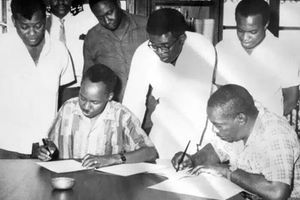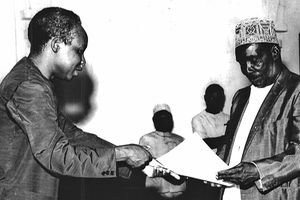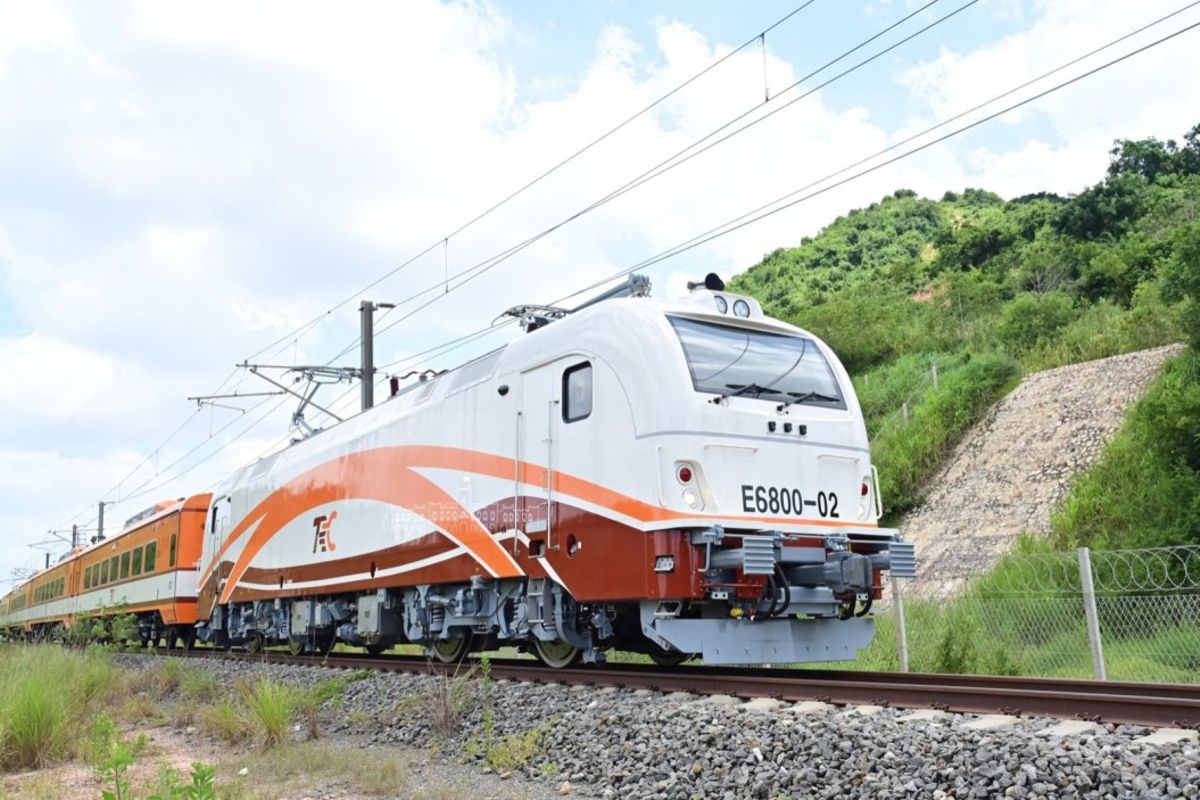SBL committed to empowering Kabila women through WASH Project with sustainable impact
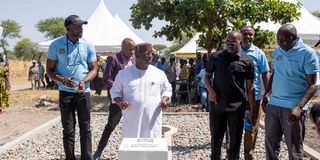
Mwanza Regional Commissioner Said Mtanda (second left) visits the site of the WASH project funded by SBL and implemented by AFRIcai in partneship with RUWASA in Kabila village, Magu district. Left is the SBL Managing Director Obinna Anyalebechi.
What you need to know:
- Through its Water for Life initiative, SBL has so far implemented water projects in water-scarce areas across the various regions of the country
Water is a vital resource for the survival of all living things on the planet. Recognizing that water is a basic need of life and one of the most essential resources, Serengeti Breweries Ltd (SBL) through its Community Social Responsibility (CSR) program, has been implementing water projects in various parts of the country aimed at providing free water to the underprivileged.
Through its Water for Life initiative, SBL has so far implemented water projects in water-scarce areas across the various regions of the country, benefiting more than 2 million people with the aim of providing clean and safe water. Iringa, Arusha, Manyara, Kilimanjaro, Mwanza, Singida, Mara, Tanga, Ruvuma, Dar es Salaam, Pwani, and Dodoma are the target regions by the project.
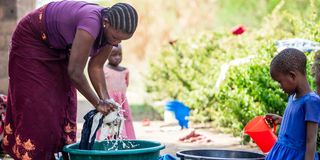
A resident of Kabila village washes clothes using water obtained from the Kabila water project funded by SBL and implemented by AFRIcai in partneship with RUWASA.
In continuation of these efforts, in June this year, SBL launched a water project worth Sh 215 million in Kabila Village, Magu District, Mwanza Region, which has a capacity to serve 12,000 residents.
The project funded by SBL and implemented by African Community Advancement Initiative (AFRIcai) in partnership with RUWASA, involved the installation of a submersible pump in a well, the construction of a pump house, a water storage tank, a network of water pipes, and 13 new water stations with a capacity to provide 87,000 cubic meters of water per year.
Speaking to this newspaper about the project, Mwanza Regional Commissioner Said Mtanda praised SBL and AFRIcai for providing this assistance to the residents of the village, saying their collaboration demonstrates the commitment of the private sector to social responsibility and sustainable development.
“These private organizations have been at the forefront of promoting development projects in the country that enable the existence of a productive and healthier community, which demonstrates the private sector’s commitment to social responsibility and sustainable development,” says Mtanda.
Mr Mtanda stated that by investing in projects that address the basic needs of the community, such as water supply, SBL demonstrates its commitment to improving the welfare of Tanzanian communities and fostering long-term success.
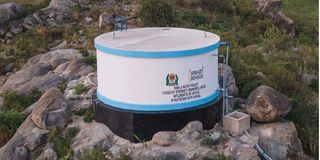
The water tank at the Kabila water project funded by SBL and implemented by AFRIcai in partneship with RUWASA in Kabila village, Magu district.
Speaking in a recent interview with this newspaper, the SBL Sustainability Manager Rispa Hatibu said that the project will not only improve the health of the Kabila residents, but also boost economic productivity, especially for girls and women. The full interview was as follows:
Women are not only the only vulnerable group when adversely affected by water woes in the remote communities, but also the disabled are included. Despite being a gender-responsive turnkey project, where does it weigh on inclusivity aspect?
While the primary focus of our WASH project is on providing clean and safe water to rural villages and remote areas in Tanzania, inclusivity remains a cornerstone of our efforts.
We recognize that women are not the only vulnerable group affected by water capacity, but also people with disabilities face significant challenges. To address this, we have partnered with organizations like Sightsavers to create a more inclusive impact, particularly in our agribusiness initiatives.
Through this partnership, we’ve launched programmes that provide farming contracts to over 100 sorghum farmers with disabilities. These farmers receive comprehensive support, including agribusiness training, financial literacy, and skills advancement.
Our aim is to empower not only women, but also men and individuals with disabilities, ensuring they have the tools and knowledge needed to thrive economically.
Aside from our water projects, we invest in farming activities related to sorghum, barley, and maize—key raw materials used in our products. This integrated approach creates a ‘triple effect,’ where our efforts in water provision are complemented by initiatives in agriculture and economic empowerment.
By embedding inclusivity into every aspect of our community programs, we ensure that marginalized groups—including women, youth, and persons with disabilities—are prioritized, with a minimum of 50% of the benefits directed towards them.
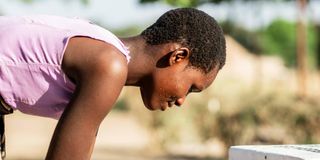
A resident of Kabila village washes her hands from the tap as a result of the WASH project funded by SBL and implemented by AFRIcai in partneship with RUWASA.
Our commitment to inclusivity ensures that our projects not only address immediate needs but also contribute to long-term, sustainable development for all members of the community.
To what extent do Kabila villagers see themselves as primary owners of the project and how is it sustainable?
The Kabila villagers have been deeply involved in every phase of the WASH project, ensuring that they see themselves as the primary owners and caretakers of the initiative. From the outset, we emphasized the importance of community ownership by providing comprehensive training to local residents on how to maintain and manage the water infrastructure.
This training has empowered them to take full responsibility for the project’s upkeep, reinforcing their role as the primary beneficiaries and stewards of the resource.
Moreover, the establishment of water committees composed of local residents further strengthens this sense of ownership. These committees are tasked with overseeing water management, ensuring equitable supply, and addressing any maintenance issues that arise.
Sustainability is also bolstered through our collaboration with local government authorities, who have been integral partners since the project’s inception. Their involvement ensures that the project is aligned with long-term community development goals and that there is continued support for its maintenance.
How has this project improved women’s availability in decision-making tables when needed?
The WOMEN in WASH project has significantly enhanced women’s involvement in decision-making processes by establishing water committees with strict gender representation criteria.
We ensured that each committee was composed of 50% women, giving them an equal platform to voice their perspectives and contribute to critical decisions regarding the water supply project.
These committees authorise women to influence how water resources should be managed, allocated, and maintained within their communities. Their input is not only valued but also essential, as the decisions made by the committees directly impact the sustainability and effectiveness of the project.
This approach has empowered women to take on leadership roles, ensuring that their voices are heard and their votes are respected in every decision-making process. As a result, women now have a stronger presence at decision-making tables, fostering a more inclusive and balanced governance structure within the communities we serve.
Kabila is just one village found in Magu grappling with WASH related challenges. Has the project expanded its horizon to other water distress societies in Lake Zone in living on its calling?
The WASH project has indeed extended beyond Kabila village. It also serves Ngw’amagoli village, bringing clean water to a combined total of 12,000 residents across both communities.
Additionally, the project’s impact in the Lake Zone has grown, with a similar initiative commissioned in Ilemela, Mwanza, in 2017, benefiting 7,560 residents. This expansion reflects our commitment to address water challenges in more communities throughout the region.
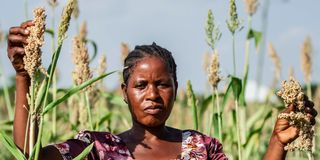
A resident of Kabila village on her farm. The WASH project funded by SBL and implemented by AFRIcai in partneship with RUWASA in the village has helped strengthen agricultural activities.
Do you feel like you have done enough around WASH projects? What stresses you as SBL in addressing this surmounting challenge?
Not yet. There are a lot of communities we want to ensure access to clean and safe water where we operate, that’s why we have set long term plans to ensure that by 2030 we have sustainable communities under our society 2030: Spirit of Progress sustainability plan.
Why siding with International partners in these projects?
Our collaboration with credible partners like CARE International, Sightsavers, and the Syngenta Foundation for Sustainable Agriculture has allowed us to broaden the scope and effectiveness of our projects. For instance, in Singida, we’ve piloted and scaled a commercial approach to integrating farmers with disabilities into SBL’s sorghum supply chain. These partnerships bring specialized expertise, resources, and a shared commitment to inclusivity, enabling us to tackle complex challenges in a holistic manner.
Strategic partnerships like these are essential because they combine our local knowledge and reach with the global expertise and resources of our partners.
Together, we can deliver more sustainable and scalable solutions that not only address immediate needs but also empower communities for the long term. Sustainable change requires a collective effort, and by working with trusted and credible partners, we can make a lasting impact on the communities we serve.
What is your goal after five years from now on?
Our goal over the next five years is centred on building sustainable and resilient communities. We envision a future where access to safe and clean water is the norm, not the exception. This access will empower communities to engage in sustainable agriculture, enhancing food security and economic opportunities, particularly in rural areas.
We are committed to expanding our impact, ensuring that more communities benefit from our WASH initiatives and that these efforts are closely integrated with agricultural development. By continuing to foster inclusivity, we aim to create environments where women not only have access to essential resources but also play a critical role in decision-making processes.
Our goal is to see more women in leadership positions within their communities, driving sustainable development and shaping a future where every voice is heard and valued.
